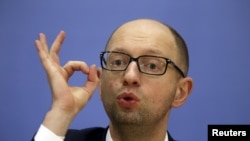Ukraine has become "very volatile" since Prime Minister Arseny Yatseniuk resigned, the head of the Council of Europe said on Monday, calling for the swift formation of a new government and speedier progress on reforms.
Yatseniuk tendered his resignation on Sunday, opening the way to seeking a more stable government for Ukraine which is struggling with an economic crisis and a conflict with Russia-backed rebels in its eastern regions.
"The situation in Ukraine is now very volatile," Thorbjoern Jagland told reporters in Brussels. "It is urgent that they establish a new government and even more urgent that they speed up the reform process."
Reforms of Ukraine's judiciary and penal system as well as decentralization were key to rebuilding public trust, he said.
"A new government will have to take this on in a much more impressive way than has been the case until now," he said.
Frustrated with cronyism and corruption, Ukrainians took to the streets in 2013-2014 in a pro-European uprising that swept the current leadership to power.
Kyiv's Soviet-era overlord Moscow annexed Crimea in March 2014, and violence erupted in the industrial east where Russia backs rebels who sought to split from Ukraine.
Ukraine's internal troubles have further complicated its path towards deeper integration with the EU, though a senior EU source said the bloc would still offer Ukraine visa-free movement this month, despite a Dutch referendum vote against an EU-Ukraine pact.
Two years after the Russian annexation of the Black Sea peninsula, the Council of Europe will present a report on Wednesday on the situation with human rights on the peninsula.
Ethnic Ukrainians and Muslim Tatars, who were opposed to the annexation of the peninsula, have found themselves in a vulnerable position as Russia moved to assert its control and quell dissent.
The 47-member state Council of Europe is separate from the European Union but works closely with it and mostly has an advisory role.





